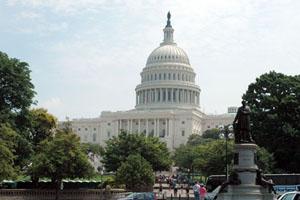New Congress, New Ideas

The 110th Congress convened last month, creating several historical precedents at the same time.
For the first time in the 218-year history of the U.S. Congress, and ending the long line of 51 male predecessors, a woman was elected Speaker of the House of Representatives. Rep. Nancy Pelosi (D-Calif.) was selected by her peers to serve as the Speaker of the House for the 110th Congress, a position third in line to the president of the United States. When the tally was announced, all 233 Democratic members unanimously cast their votes in favor of Pelosi.
Furthermore, an additional precedent was set this year with the most number of women ever elected to the U.S. Senate.
In addition to these events, for the first time in the history of our government, a Muslim was elected to serve in Congress. Congressman Keith Ellison (D-Minn.) chose to put his hand on a Quran that belonged to Thomas Jefferson, while taking the oath of office.
Not only will this Congress have more diverse members, but the agenda for the 110th will look unlike anything the American public has seen for the past 12 years under Republican leadership. The 2006 elections not only dramatically changed the power structure in Washington, but they paved the way for a vastly different way of thinking. This will prove extremely important to mason contractors and small business owners across the country.
In the first 100 hours in power, the Democrats' first order of business was to push through a sweeping ethics and lobbying package, and strict new rules on the budget process and disclosure of earmarks. Under the new leadership, House members can no longer allow a lobbyist to buy them lunch, and politicians will not be able to take privately funded trips without prior approval of the ethics committee. Congressional leaders will not be allowed to hold open roll call votes until the results fall their way, which was a customary practice under Republican leadership.
Also, lawmakers will have to decide how to apply pay-as-you-go rules to proposals for new entitlements or tax cuts. ("Paygo" is a term used by Washington insiders when referring to a budget practice in which: If the government spends more on program A, it has to spend less money on program B, and thus budget deficits will be restrained.) This particular ideal has many in the Republican party and the business community concerned. Under "paygo" rules, the number of tax cuts possible will be restrained. First on the chopping block would be the investment tax cuts of 2003 that are set to expire in 2010.
Democrats also pushed for action to implement all recommendations from the 9/11 Commission on national security. In addition, legislation was introduced to raise the minimum wage to $7.25, eliminate corporate subsidies for oil companies, allow the government to negotiate Medicare drug prices, impose new restrictions on lobbyists, cut interest rates on college loans, and support embryonic stem-cell research.
The House and Senate also worked to increase oversight of large domestic industries. Specifically, Democrats focused on drug prices, oil-company profits and FDA-regulated industries. During the month of January, the Democratic leadership made it clear that Congressional oversight would focus heavily on the Bush administration's FY 2008 budget proposal. Finally, House Democrats began examining "waste, fraud and abuse" across the federal government — particularly the rebuilding efforts in Iraq and the Hurricane Katrina-ravaged Gulf Coast.
During the next two years, Congress and the White House will debate a host of issues critical to businesses, municipalities and non-profit organizations. In addition, they will consider business left unfinished by the previous Congress, issues triggered by national and international events and matters arising from the requirements of the legislative process itself.
While legislation may advance quickly in the House, Senate rules require a more deliberative process. On issues related to education, immigration, health care and homeland security, there will be opportunities for compromise between the Democratic-controlled Congress and President Bush.
About the Author
Jessica Johnson Bennett was the Director of Government Affairs for MCAA. She has an extensive background in public affairs and government relations. Her expertise in strategic planning, PAC management and operations help on key policy issues.


















